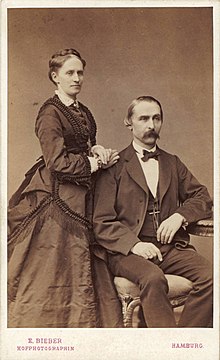Friedrich Glitza
Friedrich Johann Heinrich Glitza (born January 10, 1813 in Hamburg ; † September 24, 1897 there ) was a German educator and politician .
Live and act
Glitza, who was called "Glitz" until 1848, worked from 1828 onwards at the newly founded institution for the deaf and dumb . Here he initially worked as a teacher and from 1841 as its director. He dealt with the "German method" of deaf education invented by Samuel Heinicke and developed it further. From 1849 to 1853 Glitza worked as a private teacher; from 1851 to 1853 also at the educational institute for teachers. Together with his brother Wilhelm he founded a private high school in 1853, of which he became head one year later. The school existed until 1879.
Glitza was a member of the Constituent Assembly from 1848 and from 1859 to 1865 a member of the Hamburg parliament . From 1841 he was a Freemason in the Absalom Lodge , from 1868 in the Council of Grand Officials and from 1872 Grand Master of the Great Lodge of Hamburg . In addition, Glitza was twice elected Master of the Chair of the Hamburg Lodge Emanuel . He campaigned for the unification of all German grand lodges into a national grand lodge and for the equal recognition of the Prince Hall lodges in the USA .
From 1828 he was a member of the Hamburg gymnastics association from 1816 , which he chaired from October 10, 1846 to September 29, 1849 as "Turnwart".
Glitza's brother Adolph was the main pastor of the main church St. Katharinen .
literature
- Franklin Kopitzsch , Daniel Tilgner (Ed.): Hamburg Lexikon. 4th, updated and expanded special edition. Ellert & Richter, Hamburg 2010, ISBN 978-3-8319-0373-3 , p. 249.
Individual evidence
- ↑ Friedrich Glitza. In: Gymnastics. Festival for the centenary of the Hamburg gymnastics club v. 1816 on Sept. 2, 1916. Hamburg Regional Association for Youth Care (Ed.), Hamburg 1916, p. 44. ( online )
| personal data | |
|---|---|
| SURNAME | Glitza, Friedrich |
| ALTERNATIVE NAMES | Glitza, Friedrich Johann Heinrich |
| BRIEF DESCRIPTION | German educator and politician |
| DATE OF BIRTH | January 10, 1813 |
| PLACE OF BIRTH | Hamburg |
| DATE OF DEATH | September 24, 1897 |
| Place of death | Hamburg |
